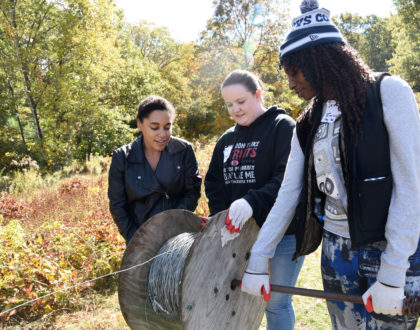Youth leaders: problem solving for community action

This year’s InIt class is off to a great start! With Immersion Week and our first two Program Days behind us, much of the staff’s focus is now on supporting our school-based delegations in planning for their Community Action Projects. InIt participants must work with the other delegates from their school to plan and implement a project that brings what they learned back into their school communities. This can take several forms, from running workshops on gender equity for their peers, to advocating for policy change that impacts transgender students, to organizing a poetry slam that focuses on race and personal identity. Delegates have until April to complete these projects, but the planning is in full force already.
Our InIt staff work closely with each delegation to ensure they have a successful planning process, not only so they will have a well thought-out project, but also to ensure they are learning from the process through problem solving and reflection. Focusing on problem solving is not only important when guiding delegates toward high-quality projects, it is also critical to supporting Social Emotional Learning (SEL) for our delegates. SEL has been a particular focus for us recently, as we partnered with the Susan Crown Exchange and David P. Weikart Center to develop a guidebook of best practices.
Thinking back that guidebook, Preparing Youth to Thrive, we emphasize three key youth experiences within the problem solving domain throughout the Community Action Project process, including these early planning stages:
Set goals.
Our delegations start their projects by assessing their school environments and brainstorming goals for the outcomes of their projects. These goals are include both the big picture (the change they would like to see in their school) and specific (the number of people they want to engage through their project and in what specific ways). For the first several meetings, delegations spend time revisiting and refining these goals in order to come up with a proposal that is both feasible and meaningful.
Planning-action cycles.
Even before launching their projects, InIt delegates are going through cycles of strategic planning, execution, responding to emerging problems, and reflecting on their outcomes. For instance, one delegation wants to hold a school-wide assembly but kept running into obstacles with timing due to their school’s packed schedule. They used their delegation meetings to come up with new ideas for how they might reach a large group of students and determine what steps they needed to take to look into each option. Throughout this process, they are continuously thinking about linking their strategy to their intended outcomes and learning through trial and error.
Outcomes verify skills.
The end-result of this planning stage will be a completed project proposal. As groups grow closer to a finished proposal, their sense of accomplishment and confidence grows. These proposals not only reflect a well thought-out plan, but months of hard work to collaborate and address obstacles as they arose. Knowing that their proposals have been approved by both their schools and the InIt staff reinforces the skills they have been working on up to this point.
We know that in order for our participants to become effective social justice leaders, we must help them to develop real world skills. The Community Action Projects are as much about delegates learning, practicing, and mastering these social emotional competencies as they are about the impact that they have on their peers and school communities. No matter the outcome of the project, we know that the problem solving skills they learn will help them to thrive as leaders, both now and in the future.
